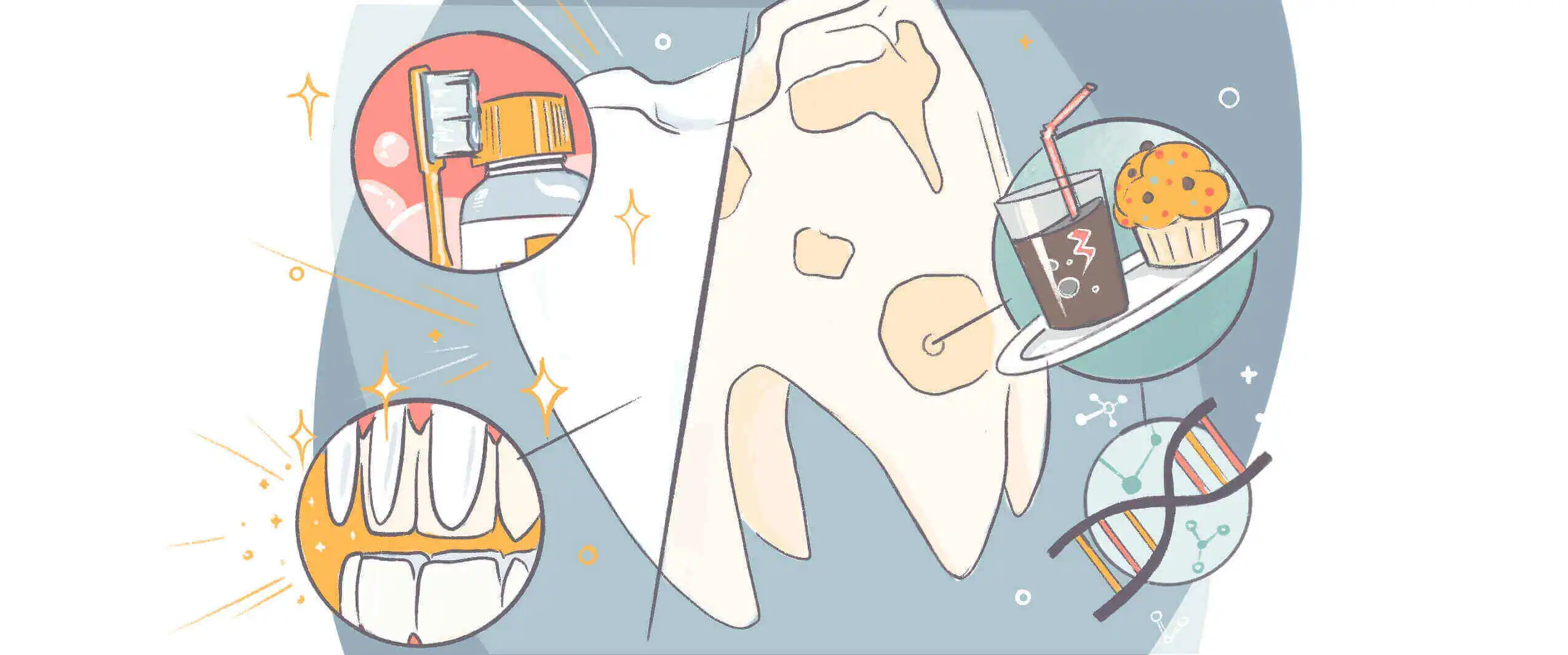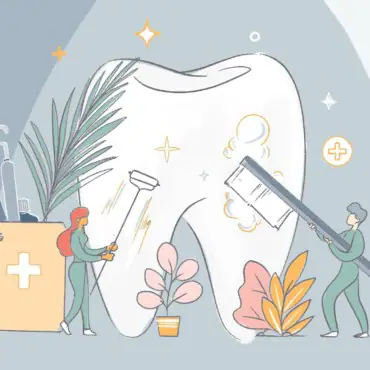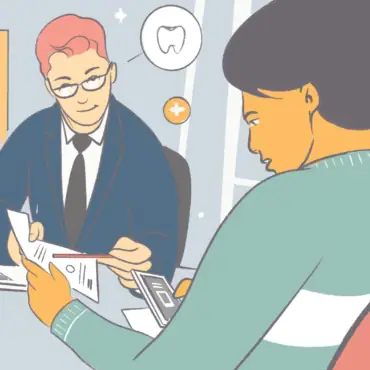Wondering why the color of your teeth has faded from a pearly white to something less photogenic? Maybe you’ve even got brown spots on your teeth? It’s easy to be embarrassed, or not want to smile, when your teeth don’t look their best. But discoloration can also be a sign of more serious problems.
Brown spots on your teeth are actually extremely common. Let’s explore some causes for tooth discoloration and then talk treatment options.
Causes
Smoking
This isn’t news to anyone. If you smoke, your teeth may likely be discolored. Nicotine use in any form can lead to brown spots on teeth. That’s because nicotine contains particles that can stick to microscopic pores in tooth enamel, leading to brown stains.
Poor dental hygiene
We’ve been hearing it since we were kids. Not cleaning or even rinsing your teeth properly leads to tooth decay. Healthy teeth depend on regular dental hygiene, so there’s not a lot of room to be lax here. Not flossing well daily or not brushing your teeth properly (twice daily!) can result in brown lines on your teeth, as food particles get stuck on them. Good oral health can’t happen without your conscious effort. So put in the work and reap the rewards.
Eating and drinking
Anything you eat or drink which is darkly pigmented, can lead to brown spots on teeth. Black coffee, red wine, and cola are all culprits – as are grapes, blueberries, cherries, and pomegranates. Popsicles and candy can be guilty too. Be selective about what you’re eating and drinking.
Genetics
Some people just naturally have whiter – or darker – teeth than others. And that’s ok. Your tooth discoloration might simply be a result of natural pigments you inherited from your parents. Just as skin color varies, so does tooth color. Even some infections during pregnancy can affect proper growth of a baby’s enamel, leading to discoloration later in life.
Medical condition
Some medical conditions can also prevent normal production of dental enamel, the white, outer layer of your teeth – leading to discoloration. Even some medication treatments, like head and neck radiation or chemotherapy can affect enamel production.
Medication
Some medications have also been known to stain teeth. The antibiotics tetracycline and doxycycline can make teeth yellow or gray when given to kids under the age of 8. That’s because these medications have been known to affect the formation of enamel in young children. Some antipsychotic drugs can stain teeth in adulthood as well. Ask your dentist for their oral care recommendations while taking any of these medications.
Trauma or injury
According to one report, some discolorations are caused by injury you may have suffered when you were young. Whether in an accident or just common playtime, if you injured your teeth as a kid, it may have interrupted proper enamel growth.
Aging
We don’t like to admit it, but we’re all getting older. As we age, our enamel wears out, exposing underneath layers of yellow dentin (the softer, more porous layer beneath our white enamel outer layer). This explains why kids tend to have whiter teeth than adults; their enamel layer is thicker and hides the yellow hue of the dentin beneath the surface. As we age, enamel decreases, dentin expands, and our teeth begin to appear darker.
Due for a checkup?
Find a top rated dentist near you that takes your insurance.
Dental materials
Some amalgam restorations, particularly silver-sulfide-containing materials, can give your teeth a gray or black cast.
It could even be a cavity
That change in color also could indicate a cavity. These little holes are caused by plaque eating away at your enamel and, if left untreated, can quite literally destroy your teeth. A cavity may at first appear as white spots, which later become brown or even black as decay advances. According to some reports, other cavity symptoms may include lingering sensitivity to cold or hot foods or even toothache. If you suspect you have a cavity, you should consult your dentist as soon as you can.
Treatment
There are loads of treatment options for brown spots on teeth. While you’ll probably pursue whitening for aesthetic reasons, your dentist can direct you through the options specific to your teeth. Better yet, he or she can help you determine the cause of your discoloration. (Knowledge is power!)
Proper dental hygiene
Right now, there are billions of bacteria living in your mouth (sorry), ready and waiting to build up as plaque, which leads to cavities, bad breath, and tooth discoloration. Don’t give them the chance! Normalize brushing your teeth after every meal. Floss and rinse with an antibacterial mouthwash once a day. It’s easier to make this a habit than you think.
Professional teeth whitening procedures
There are several teeth-whitening products and procedures that can reduce stains. If your discoloration can be simply corrected through whitening, go with this option. Just be sure to speak to your dentist to confirm whitening will treat the cause of your stains. Also be aware that some at-home whitening products can cause tooth sensitivity and irritation.
Due for a checkup?
Find a top rated dentist near you that takes your insurance.
Tooth bonding
Tooth bonding is a simple procedure used to repair a discolored tooth and other varieties of tooth defects. It involves applying a color-matched material to a tooth, sculpting it into shape, and polish it to make it durable.
Enamel microabrasion
Enamel microabrasion is a procedure that uses both mechanical and chemical means to remove a small amount of tooth enamel. This treatment can eliminate superficial discoloration resulting from tobacco, intensely colored foods, or fluorosis.
Veneers
Veneers are covers that are placed on the surface of the teeth. They are sometimes used to treat tooth discoloration, but should be considered a last resort. This option will be recommended if none of the other treatment options can fix the cause of brown spots on teeth.
See your dentist!
If your stains don’t begin to reduce or go away after a few days of regular brushing and proper care, or if you’ve tried whitening products to no effect, then it’s time to see your dentist and find out what’s going on. In many cases, a short visit will have you walking away with whiter teeth.
Remember Opencare makes it super-easy to find a dentist whenever you’re ready! If you’re concerned about any spots or discoloration on your teeth, get on the case right now and book an appointment to find out which treatment option is right for you. We know you’ll be happy you did.
Due for a checkup?
Find a top rated dentist near you that takes your insurance.








